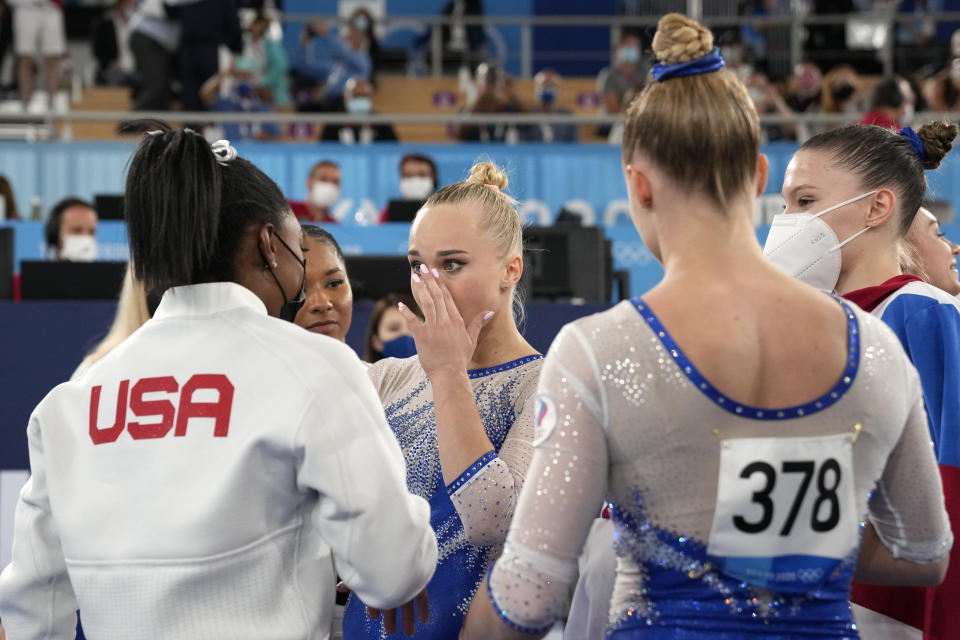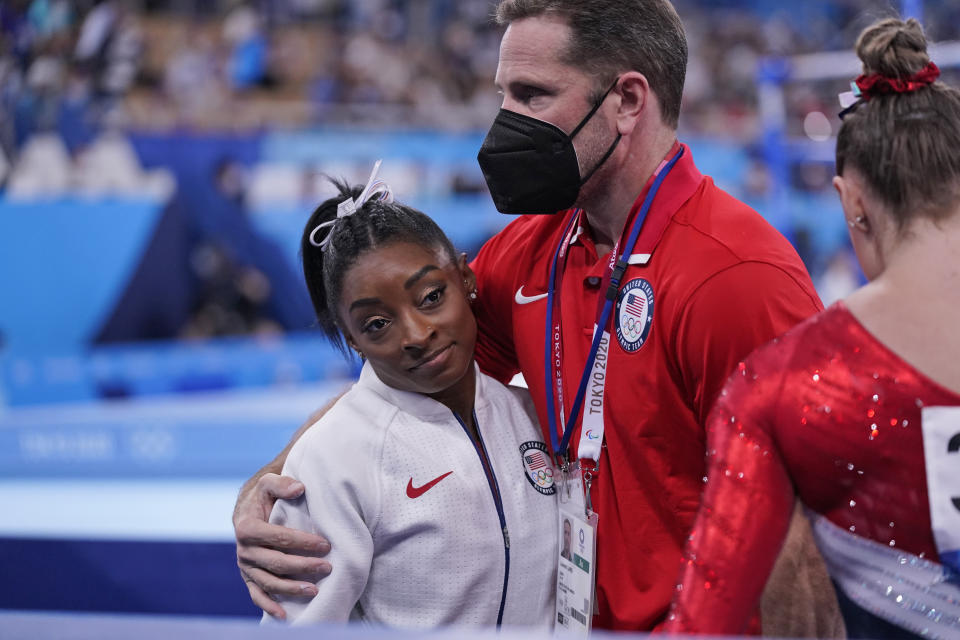Column: For Simone Biles, it finally all becomes too much
Finally, it all became too much. Simone Biles felt it hours before she took the floor in Tokyo, a nervousness she couldn’t explain as she waited to deliver what everyone except her was sure would be a gold medal for the U.S. women’s gymnastics team.
“I was just like shaking, could barely nap,” Biles said. “I’ve never felt like this going into a competition before.”
Five years ago, she came through for her country with a haul of four golds and a silver in Rio de Janeiro. But this night in Japan — with the official coronation of her Olympic greatness at stake — proved one bridge too far, even for the gymnast considered by many to be the greatest ever.
Not only was Biles supposed to lead her team to gold, but to jump-start an Olympics that is being largely ignored at home. She was facing the pressure of Olympic history while also being tasked with bringing eyeballs to prime-time Tuesday night TV to help salvage the billion dollars or so that NBC spent to land the Games.
That she failed before she even started was as stunning as it was dispiriting. She had no injury and offered no other excuses before withdrawing after a poor vault in the first rotation.
Just not enough mental focus to feel she could compete with her teammates against the Russians and everyone else.
If it was shocking, it couldn’t have been all that surprising. Olympic history is littered with athletes who for one reason or another couldn’t rise to the occasion.
Add to that the fact that being the face of the Olympics for an entire nation is hard, extraordinarily hard.
On the same day Biles found herself unable to continue, Japan’s Naomi Osaka was unceremoniously bounced from the Games amid continuing questions about her mental health, which prompted her to withdraw from the French Open two months ago. Like Biles, the tennis player was supposed to be her country’s star athlete, and the intensity mounted when she was chosen to light the Olympic flame at the opening ceremony.
It didn’t matter that there were no fans on hand to watch her lose in the third round of the Olympic tennis tournament. Eyeballs around Japan were focused on her every move, and she felt every one of them.
“I definitely feel like there was a lot of pressure for this,” Osaka said. “I think it’s maybe because I haven’t played in the Olympics before and for the first year (it) was a bit much.”
Part of the problem is the Olympics themselves. They take on outsized importance for many athletes, who understand that not only are they competing for their country but also only have a chance on the big stage every four years.
Come through and you’re a hero. Fail, and the finger-pointing begins.
Dan Jansen was a victim of that, long before mental health was something athletes were comfortable discussing. The best speedskater in the world, he fell in two races in the 1988 Olympics as the television cameras were recording his every move as the expected star of the games.
Jansen was also competing after just learning his sister had died from leukemia. Still, a skater who seemed destined to win a handful of Olympic medals would only end up with one in four different Games.
Dan O’Brien, on the other hand, had a meltdown even before his first Olympics. He and decathlon rival Dave Johnson were the subject of a big ad campaign by Reebok before the 1992 Games. America knew him well, and his story rivaled that of the Dream Team as summer approached.
But O’Brien famously missed on a pole vault mark in the Olympic trials and never qualified for Barcelona.
Four years later, O’Brien got a second chance, this time without the ad campaign and without a lot of the pressure. He would win gold in Atlanta for the kind of redemption most Olympic athletes never get.
Like O’Brien, Biles will get a second shot — if she wants it. After her teammates finished second to the ROC in the team competition, she said she would regroup before deciding whether to continue in the individual events.
Her teammates still want her. Her country still needs her. And an Olympics longing for big stars is desperate for her.
“To see her kind of go out like that is very sad because this Olympic Games, I feel like, is kind of hers,” teammate Sunisa Lee said.
Just as no one should dispute Biles’ greatness, no one should argue with her decision. She’s in charge of herself, and anyone doubting her resolve should take a look at her trophy case.
She’s thrilled us before, and it didn't even look like she was trying. Shame on us if we thought it would be easy for her to do it again.
On this night, at this Olympics, it was simply too much.
___
Tim Dahlberg is a national sports columnist for The Associated Press. Write to him at tdahlberg@ap.org or https://twitter.com/timdahlberg







